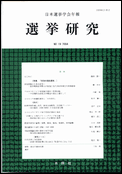Current issue
Japanese Journal of Electoral Studies
Displaying 1-6 of 6 articles from this issue
- |<
- <
- 1
- >
- >|
-
2022Volume 38Issue 2 Pages 5-19
Published: 2022
Released on J-STAGE: March 26, 2025
Download PDF (1470K) -
2022Volume 38Issue 2 Pages 20-33
Published: 2022
Released on J-STAGE: March 26, 2025
Download PDF (1170K) -
2022Volume 38Issue 2 Pages 34-47
Published: 2022
Released on J-STAGE: March 26, 2025
Download PDF (1097K) -
2022Volume 38Issue 2 Pages 48-62
Published: 2022
Released on J-STAGE: March 26, 2025
Download PDF (1616K) -
2022Volume 38Issue 2 Pages 63-82
Published: 2022
Released on J-STAGE: March 26, 2025
Download PDF (1097K) -
2022Volume 38Issue 2 Pages 83-89
Published: 2022
Released on J-STAGE: March 26, 2025
Download PDF (920K)
- |<
- <
- 1
- >
- >|
